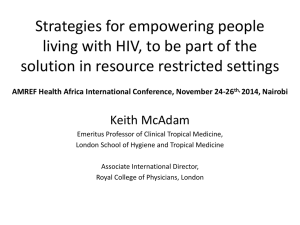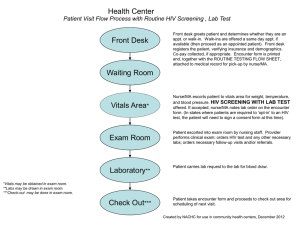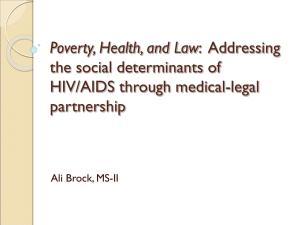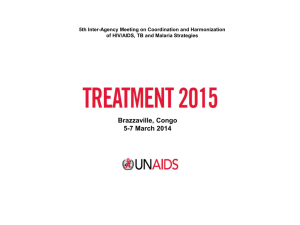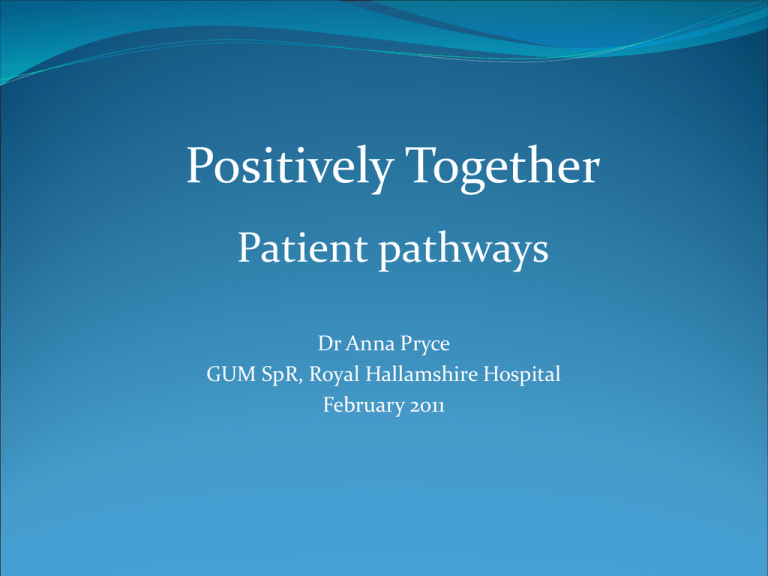
Positively Together
Patient pathways
Dr Anna Pryce
GUM SpR, Royal Hallamshire Hospital
February 2011
Patient Pathways: Outline
HIV in Sheffield
Testing pathways
Local innovation
Care pathways
Discussion
HIV in Sheffield
1 in 700 people in Sheffield have been diagnosed
with HIV
Around 750 people receive care in Sheffield
(including non-residents)
People of African origin and men who have sex
with men are disproportionately affected
47 % are diagnosed late (CD4<200)
Late diagnoses by PCT Yorkshire and the
Humber
Guidance on testing:
HIV in the United Kingdom: 2009 Report (HPA):
“Initiatives to expand HIV testing in clinical and community
settings should be promoted”
2008 National Guidelines for HIV testing:
Tests should be offered to all adults registering in general practice
and to all general medical admissions where HIV prevalence is
>2/1000 (Sheffield 1.4/1000)
NICE guidelines: Increasing uptake of HIV testing
amongst black Africans and MSM (due March 2011).
Opportunities for testing
Screen in high prevalence areas >2/1000
Test if risk factors (may need episodic testing)
Test if symptoms of primary HIV infection/seroconversion
illness
Test if indicator diseases
De-mystifying HIV testing
All healthcare professionals should be able to obtain
informed consent
Lengthy pre-test counselling un-necessary
Testing should be normalised
All those offering testing should be aware of referral
pathways to specialist services
Testing for HIV
• HIV test
• may be positive from 2.5 weeks
• repeat test at 3/12 still recommended
Send serum sample with virology form specifying
“HIV test”
Organise follow-up with patient in 1 week
Support is available for all REACTIVE results
Local innovation
•HIV sampling for MSM in Sheffield
•Salivary sampling pilot 2009
•126 kits distributed (60 returned)
•38% never tested before
•28% bisexual
•No HIV diagnoses
Other local innovations
Gilead UK and Ireland Fellowship funded outreach
testing in Black African communities
Partner testing study
Routine testing in General Practice
Targeted HIV testing in ITU
The routine offer and recommendation of HIV testing
in primary care and hospital settings is feasible and
acceptable to patients and staff.
Shared care pathways
Intra hospital care pathways
e.g. Karposi sarcoma, antenatal, renal, hepatitis co-infection etc.
Joint care pathways with General Practice
Not yet established
Great scope for joint expertise in long term clinical management
e.g. hyperlipidaemia, hypertension, eczema, asthma/COPD etc.
Cytology and vaccinations
Partnerships with other care providers
IVDU, alcohol, asylum seekers
Partnerships with voluntary organisations
HIV care pathways
Use CD4 count to decide if health problem likely to be
related to HIV
If poor CD4 count discuss with HIV specialist
Encourage communication between GP and HIV
specialist
Important both ways – we want to know about non-HIV
health problems!
Further information
http://www.medfash.org.uk/publications/documents/
HIV_in_Primary_Care.pdf
http://www.bashh.org (National Guidelines for HIV
testing)
http://www.bhiva.org/TreatmentofHIV1_2008.aspx
(HIV Treatment Guidelines)
http://guidance.nice.org.uk/PHG/Wave19/3 (Draft
NICE Guidelines for black Africans)
http://guidance.nice.org.uk/PHG/Wave19/4 (Draft
NICE Guidelines for MSM)
Discussion
Barriers to HIV testing and accessing care
Communication between HIV specialists and
other care providers
Development of shared care pathways
Contact details: anna.pryce@sth.nhs.uk


